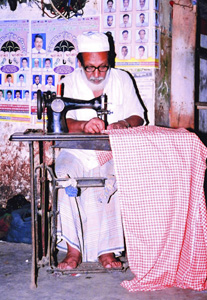Darji

Darji (tailor) an occupational group engaged in cutting and sewing cloths and also repairing dresses. Tailoring was introduced by Muslims largely because of the fact that Muslim males and females required sewed outfits. Hindu males wore unsewed dhuti and orani (wrapper) and Hindu women traditionally put on sari also not requiring any tailoring work. With the passage of time, Hindus adopted the profession to cater to the needs of changed dress habits in a world of changing fashions. Initially, darjis did not have sewing machines and worked manually with scissors, needles, and threads. Many of them knew some embroidery work also.
The modern day darjis invariably use sewing machines, and most sewing machines they use are mechanical and have pedals. Sewing machines in garment factories are electrical and the readymade garments made in these factories have now reduced the demand of tailored dresses and consequently, the work of the darjis. But darjis still remain an essential service group everywhere in Bangladesh. Ordinary people in the country have not yet developed the habit of using readymade garments and generally wear lungis, shirts, trousers and other types of dresses tailored by darjis.
The increasing number of shops selling readymade dresses for men, women, and children use darjis on hire or as subcontractors to get their supplies. [Gofran Faroqi]
